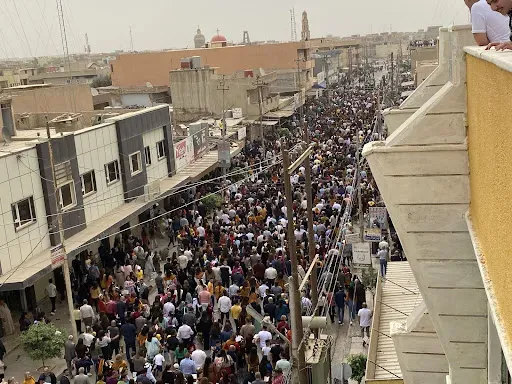Only some infirm and elderly remained in Qaraqosh, who could not leave.
Abdullah could not describe her feelings as she left her town, leaving her son alone on his first night in his grave. "My eyes did not stop shedding tears on the roads to Erbil, and black thoughts were thrown at me, and I was afraid that they would exhume the grave or desecrate it."
Qasha explained that the roads leading to Erbil and Dohuk, larger cities with Christian strongholds inside the semi-autonomous Kurdistan region, were filled with crowds. Tens of thousands of Christians fleeing Christian villages and towns waited for hours to cross the Kurdistan Region's checkpoints in search of safety in Erbil.
Abdullah recounted the harsh conditions they lived through during the period of displacement. During that time, they resided in a school-turned-IDP camp in Erbil, which ultimately absorbed the weight of the IDPs in the Nineveh Plain. Her family shared one classroom with six other families, the cramped quarters exacerbating the psychological difficulty of displacement.
Ultimately, the family sought refuge in France but demanded that they be returned to their homeland after the liberation of Qaraqosh so that Abdullah could be assured that the grave of her murdered son was respected.
(Story continues below)
A moment of redemption for Qaraqosh
On 7 March 2021, during his apostolic visit to Iraq, Pope Francis prayed the Angelus with Christians in the Syriac Catholic Immaculate Conception Church in Qaraqosh.
"Our gathering here today shows that terrorism and death never have the last word. The last word belongs to God and to his son, the conqueror of sin and death," Pope Francis said.
"Even amid the ravages of terrorism and war, we can see, with the eyes of faith, the triumph of life over death," the Holy Father said.
Seven years after the death of her son, Abdullah presented her testimony before Pope Francis in the Church of the Great Immaculate in Qaraqosh during his historic visit to Iraq on 7 March 2021.
There she recounted the story of the murder of her child, his cousin, and their young neighbor who was preparing for marriage in the light of faith and hope that molded her understanding of the deaths in the years since the attack and fall of the city.
"We as Christians believe strongly that we are always martyrdom projects," Abdullah told the Pope and highlighting that "the martyrdom of these three angels was a clear sign for us, and if it weren't for them, the people would have stayed in Qaraqosh and would have definitely fallen into the grip of ISIS.
"Their lives saved the whole city," she stressed, concluding with a note of hope, "Our strength inevitably comes from our belief in the resurrection, our clinging to hope, and our belief that our children are in heaven in the bosom of the Lord Jesus."
Pope Francis said that Doha Sabah Abdallah's words on forgiveness touched him deeply.
"The road to a full recovery may still be long, but I ask you, please, not to grow discouraged. What is needed is the ability to forgive, but also the courage not to give up," Pope Francis said.
"You are not alone! The entire Church is close to you, with prayers and concrete charity."








